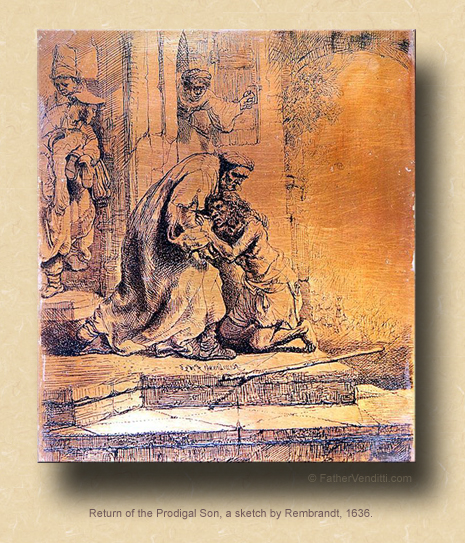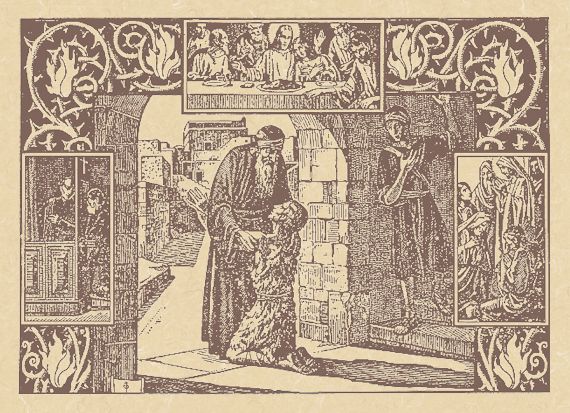Must We Always Collect Our Pound of Flesh?
The Third Saturday of Lent.*
Lessons from the feria, according to the ordinary form of the Roman Rite:
• Micah 7: 14-15, 18-20.
• Psalm 103: 1-4, 9-12.
• Luke 15: 1-3, 11-32.
Lessons from the feria, according to the extraordinary form of the Roman Rite:
• Genesis 27: 6-40.
• Psalm 91: 2-3.
• Luke 15: 11-32.
The Third Saturday of the Great Fast; the Third All Souls Saturday;** and, the Feast of Our Venerable Father & Confessor Procopius the Decapolite.
First & third lessons from the pentecostarion, second & fourth from the menaion of the dead, according to the Ruthenian recension of the Byzantine Rite:
• Hebrews 10: 32-38.
• I Thessalonians 4: 13-17.
• Mark 2: 14-17.
• John 5: 24-30.
FatherVenditti.com
|
 9:08 AM 2/27/2016 — Today our Lord presents to us a story about forgiveness which is so familiar to us that we automatically assume we know what it means: the prodigal son returns and his father forgives him, illustrating the comforting fact God is ready to forgive us no matter how far we stray. That's a good third grade explanation of the parable, but it isn't sufficient because there are more than two characters in this story: there's a son who goes astray and a father who forgives him; but, there's also another son, and he's the one who's important. 9:08 AM 2/27/2016 — Today our Lord presents to us a story about forgiveness which is so familiar to us that we automatically assume we know what it means: the prodigal son returns and his father forgives him, illustrating the comforting fact God is ready to forgive us no matter how far we stray. That's a good third grade explanation of the parable, but it isn't sufficient because there are more than two characters in this story: there's a son who goes astray and a father who forgives him; but, there's also another son, and he's the one who's important.
Every once in a while, especially during this Holy Season, a priest will run into people in confession who've been away from the Church for a long time, and it's usually because something terrible happened to them and they decided to blame God: they lost a spouse or a child or had to suffer some terrible illness and this shook their faith in God as if, somehow, God let them down: "I lived a good life, so why would God let this happen to me?"
I always recommend them to read the book of Job, and you've heard me preach about it not long ago, when we compared his story to that of his fellow prophet, Jonah. It begins by saying how there was no man in all the world more pleasing to God than Job, and how God allowed Job to be tested by Satan by having everything taken from him, including his children, and finally being afflicted with a horrible chronic illness. And his wife thinks he's crazy because he continues to praise and worship God. And Job's response to her is one of the most electrifying verses in the Bible: "Naked I came from my mother's womb, and naked shall I return; the Lord gave, and the Lord has taken away; blessed be the name of the Lord” (Job 1: 21 RSV).
Now, we don't see that kind of faith very often. Our faith is not unconditional like Job's. We put in the hours by living a good life, then we expect God to pay the wage—in spite of the fact that Jesus told us, on more than one occasion, that reward and punishment are not in this life, and that God allows it to “rain on the just and unjust alike.” But we ignore all of that. We still believe that God should reward us for our good life now; and, if he doesn't then there's something wrong with Him.
And that's the real message of this parable. Yes, of course it is a story about forgiveness, and we should feel comforted by the fact that God is always willing to forgive as long as we are willing to repent. But there's a lot more to the story than that. We often overlook the fact that, in having the father in the story react the way he does to his elder son, Jesus has completely thrown out every notion of human justice there ever was.
We always overlook the older son in this story. We always focus on the younger son, the prodigal son; that’s why we call it “the Parable of the Prodigal Son.” But the older son is important, too. He goes to his father and makes two accusations: he accuses his brother of wasting his inheritance on loose women;—an accusation for which there is no evidence, since the Gospel only says he ran out of money but doesn't say why—but, he also accuses his father of being unfair, and this accusation is true. In doing what he does for the prodigal son, the father has done a gross injustice to his elder son.
And isn't the reaction of the older son exactly how we react to God when we think He's been unfair to us? We lose a loved one to death, for example—a child or a spouse or a parent—and we don't care that God has taken that person to Himself; we only care what we think He's done to us. Or we or someone we love is forced to suffer a long or painful illness. We don't care that He's given that person a great opportunity to avoid Purgatory by allowing them to sacrifice here on earth; we only want Him to be nice to us now.
We, of course, don't fault the father for his forgiveness because we know he represents God, and we like the idea of God always willing to forgive us no matter how wretched we've behaved; but, his manner of forgiveness is not typical, and highlights the fact that we often don't look at what he does in this parable closely enough, because the way the father chooses to forgive his younger son is actually very foreign to us. He doesn't scold him, nor does he offer his forgiveness conditionally, demanding an apology the way we usually do. We make ourselves feel better, pretending to be magnanimous by saying, “I forgive you,” but we always make sure to collect our pound of flesh in the process. Our forgiveness is really nothing more than a kind of emotional blackmail: “I forgive you, so long as you continue to feel guilty about it.” And you have to admit that, nine times out of ten, that's how we “forgive” anyone whom we feel has done us wrong. But the father in the parable doesn't do any of that; instead, he interrupts his son's apology and throws a party, pretending that the offense never took place, which only highlights the difference between the kind of forgiveness we so often offer to each other and the nature of God's forgiveness to us when we've sinned.
As a society, we've become obsessed with the whole concept of fairness, and as Americans we've been conditioned to frown upon any hint of injustice; and, this kind of thinking infects our relationship with God. The use of this familiar parable as the Gospel lesson of today's Mass gives us an opportunity to reflect on the fact that God doesn't deal with any of us according to the rules of human justice. God owes us nothing. And even if we live a perfect life of perfect virtue, God owes us nothing. Living the way God wants us to live is what we owe to God; and, to quote a line I've used many times before, salvation—which is the only goal of the Christian’s life—is not payment for services rendered.
As this season of Lent continues, let us pause to reflect on what kind of conditions we may have placed on our love and worship of God, and be thankful for the fact that God has placed no such conditions on us, making forgiveness of our sins only a confession away.

* Cf. the post here for an explanation of how the days of Lent are identified on this site.
** Unlike the Latin Church, which commemorates the Holy Souls but one day each year on November 2nd, the Churches of the Byzantine Tradition observe an All Souls Day five times each year: once just prior to the Triodion (pre-Lent), three times during the Great Fast, and once during the Paschal season, all on a Saturday. They are commonly referred to as the All Souls Saturdays. Their lessons and texts are added, as usual, to whatever other observances occur on that day.
|

